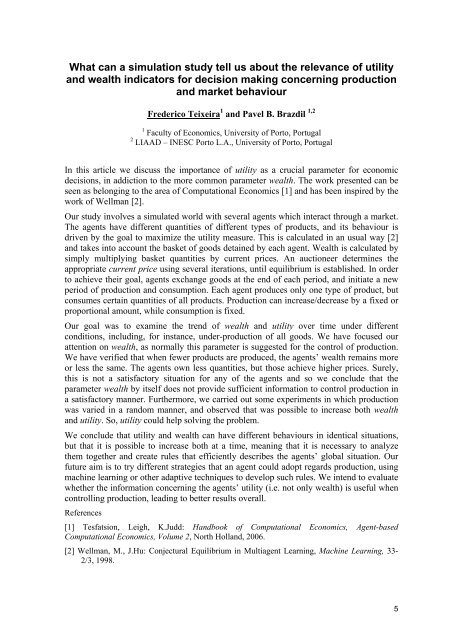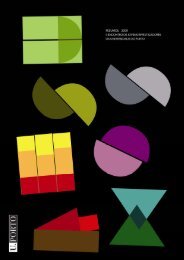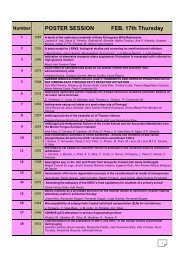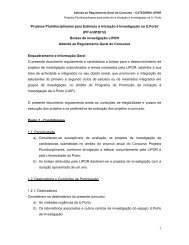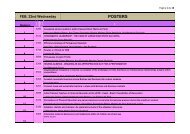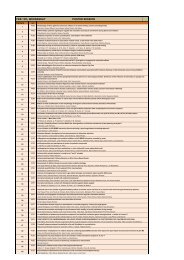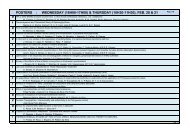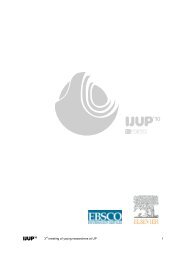IJUP08 - Universidade do Porto
IJUP08 - Universidade do Porto
IJUP08 - Universidade do Porto
- TAGS
- universidade
- porto
- ijup.up.pt
Create successful ePaper yourself
Turn your PDF publications into a flip-book with our unique Google optimized e-Paper software.
What can a simulation study tell us about the relevance of utility<br />
and wealth indicators for decision making concerning production<br />
and market behaviour<br />
Frederico Teixeira 1 and Pavel B. Brazdil 1,2<br />
1 Faculty of Economics, University of <strong>Porto</strong>, Portugal<br />
2 LIAAD – INESC <strong>Porto</strong> L.A., University of <strong>Porto</strong>, Portugal<br />
In this article we discuss the importance of utility as a crucial parameter for economic<br />
decisions, in addiction to the more common parameter wealth. The work presented can be<br />
seen as belonging to the area of Computational Economics [1] and has been inspired by the<br />
work of Wellman [2].<br />
Our study involves a simulated world with several agents which interact through a market.<br />
The agents have different quantities of different types of products, and its behaviour is<br />
driven by the goal to maximize the utility measure. This is calculated in an usual way [2]<br />
and takes into account the basket of goods detained by each agent. Wealth is calculated by<br />
simply multiplying basket quantities by current prices. An auctioneer determines the<br />
appropriate current price using several iterations, until equilibrium is established. In order<br />
to achieve their goal, agents exchange goods at the end of each period, and initiate a new<br />
period of production and consumption. Each agent produces only one type of product, but<br />
consumes certain quantities of all products. Production can increase/decrease by a fixed or<br />
proportional amount, while consumption is fixed.<br />
Our goal was to examine the trend of wealth and utility over time under different<br />
conditions, including, for instance, under-production of all goods. We have focused our<br />
attention on wealth, as normally this parameter is suggested for the control of production.<br />
We have verified that when fewer products are produced, the agents’ wealth remains more<br />
or less the same. The agents own less quantities, but those achieve higher prices. Surely,<br />
this is not a satisfactory situation for any of the agents and so we conclude that the<br />
parameter wealth by itself <strong>do</strong>es not provide sufficient information to control production in<br />
a satisfactory manner. Furthermore, we carried out some experiments in which production<br />
was varied in a ran<strong>do</strong>m manner, and observed that was possible to increase both wealth<br />
and utility. So, utility could help solving the problem.<br />
We conclude that utility and wealth can have different behaviours in identical situations,<br />
but that it is possible to increase both at a time, meaning that it is necessary to analyze<br />
them together and create rules that efficiently describes the agents’ global situation. Our<br />
future aim is to try different strategies that an agent could a<strong>do</strong>pt regards production, using<br />
machine learning or other adaptive techniques to develop such rules. We intend to evaluate<br />
whether the information concerning the agents’ utility (i.e. not only wealth) is useful when<br />
controlling production, leading to better results overall.<br />
References<br />
[1] Tesfatsion, Leigh, K.Judd: Handbook of Computational Economics, Agent-based<br />
Computational Economics, Volume 2, North Holland, 2006.<br />
[2] Wellman, M., J.Hu: Conjectural Equilibrium in Multiagent Learning, Machine Learning, 33-<br />
2/3, 1998.<br />
5


